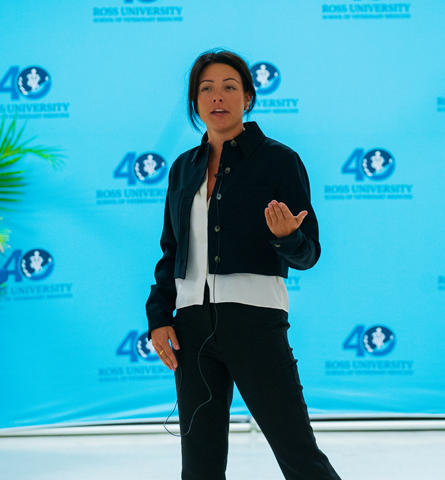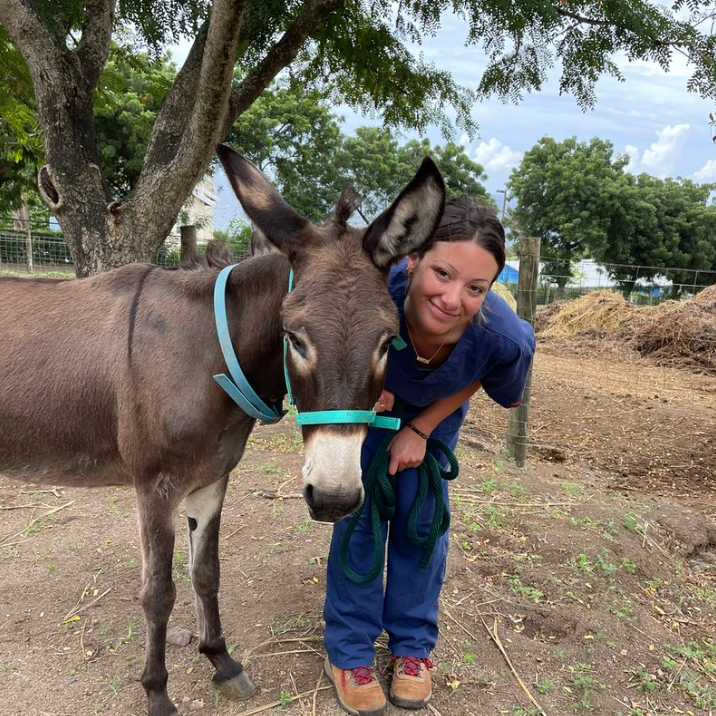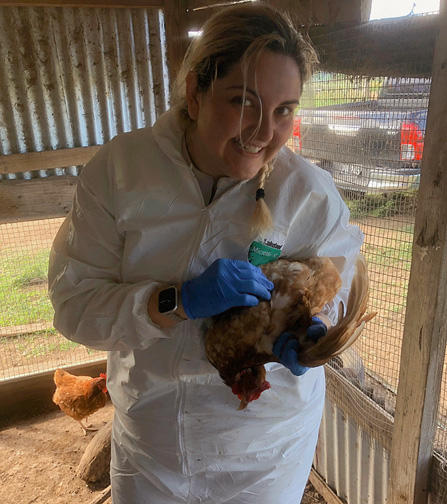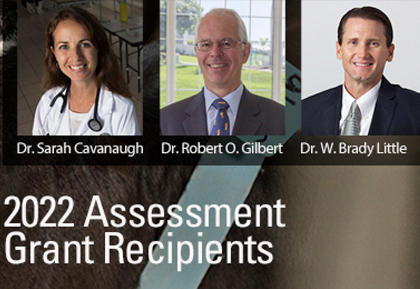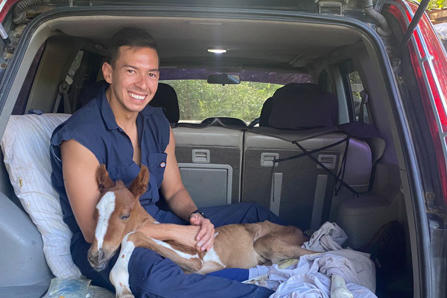The Three Minute Thesis (3MT) competition is a crowd favorite of Ross University School of Veterinary Medicine’s (Ross Vet) annual Research Week event. Isabella Liberti, Master of Science (MSc) by Research candidate, called winning this year’s competition a validating moment for her research in animal emotions and behavioral response.
“It was a very proud and surreal experience that I was recognized and that my message was understood. One of the main goals of the Three Minute Thesis is finding a middle ground between something as dense as research and connecting it with the public audience, and that was what I was most proud that I was able to take this complicated stuff and make it so everyone can connect to the work we're doing," Liberti said.
Decoding the Language of Animals
Liberti’s presentation on “Decoding the language of animals” is a window into one small part of a larger research project: “The assessment of salivary cortisol and oxytocin of donkeys undergoing different methods of reinforcement training.” Together with Luis Pablo Herve Claude, DVM, MPVM, PhD, assistant professor of veterinary public health and epidemiology, Cynthia Xue, DVM, PhD, assistant professor of equine internal medicine, and Don Bergfelt, MS, PhD, department head of biomedical sciences, the research team has developed a project that analyzes various methods of reinforcement training in donkeys and their emotional responses through Ross Vet’s Center for Research & Innovation in Veterinary & Medical Education.
As part of the research being conducted, Liberti recorded ethograms every day she visited the lab and worked with the donkeys. An ethogram is a catalog of behaviors exhibited by an animal to objectively study their behavior.
“There are different methods of reinforcement, whether it’s positive or negative, or an alternative method of training. While we're testing various reinforcement trainings, we are observing whether the animals are happy during a particular reinforcement method. Are they stressed out or scared?”
Liberti continued: “Along with the ethogram, over time, as we track behaviors with associated responses to certain reinforcements, we can then compare in terms of the oxytocin and the cortisol hormone levels we track elsewhere. If we see a rise in cortisol with negative behaviors in the ethogram, we know the animal is stressed; if we see a rise in oxytocin, we know the animal is enjoying that type of reinforcement and could continue working well as training continues.”
The Three Minute Thesis
What separates the 3MT competition from other presentation forms is the uniqueness with which complex research needs to be quickly and clearly summarized. Presenters have just three minutes and a single, static slide to share compelling and engaging talks on their research topic. Liberti was one of 10 students from Ross Vet’s Doctor of Veterinary Medicine (DVM) and MSc by Research programs who volunteered for the competition.
Before she enrolled in Ross Vet’s MSc by Research program, Liberti studied animal science at the University of Delaware and was working at The Greenburgh Nature Center that provided her plenty of the tools she needed to turn her ethograms into an engaging topic for the audience.
“I taught children of all different age groups, children with special needs, adults and parent groups, all about animals,” she recalled. “Gauging who my audience was something I had to learn as soon as I started because I knew if I presented to adults the same way I did to kids, the message will not come across.”
Liberti likens it to solving a puzzle, figuring out how you can best get your message to your audience. To a crowd of her DVM and MSc candidates and faculty judges, the task was easy enough — keep it simple and accurate.
“I wanted everyone to understand ethograms and learn that when we're working with animals, no matter what we're doing — if you are a groomer, a dog walker, cleaning a cage — you should have a specific ethogram for the species that you're working with, and you should understand their behavior. We need to learn the exact behaviors and needs of each animal that we're working with to succeed with them.”
For Liberti, It’s Personal
Liberti was born and raised in Westchester County, New York. Among her earliest memories of spending countless hours outdoors, she learned of the unconditional love of animals and the special bond that brings in our most difficult circumstances.
“I lost my father at a young age, and spending time with just me and my mom outdoors was everything I’d ever known,” Liberti recalled. Some years after losing her father, her mother was diagnosed with cancer and spent many days and weeks in the hospital.
“I was alone and only had my dog and the outdoor animals that were around me. They got me through. Being able to connect with animals was such a safe space for me. I learned from such a young age that it's something that will never let me down and will give me unconditional love. I wanted to dedicate my whole life to them because they're just so pure and amazing and have been so therapeutic for me.”
Though working with animals was always the plan, Liberti never had her sights set on pursuing her DVM. Instead, she wants to take her passion for animal behavior and welfare into a career in zoos. From her time at Greenburgh and following in the footsteps of her childhood hero, the famed Steve Irwin, Liberti loves everything involved with animal husbandry down to the behind-the-scenes work keeping their habitats as enriching and clean as possible.
“I’m dedicated to making them as happy as they possibly can be in in captivity, teaching the public about why we should care about wellbeing and how we can help them, and just educating people on stuff that I've loved my whole life.”
Learn more about how your passion for animal health can lead you to a world of possibilities here.



